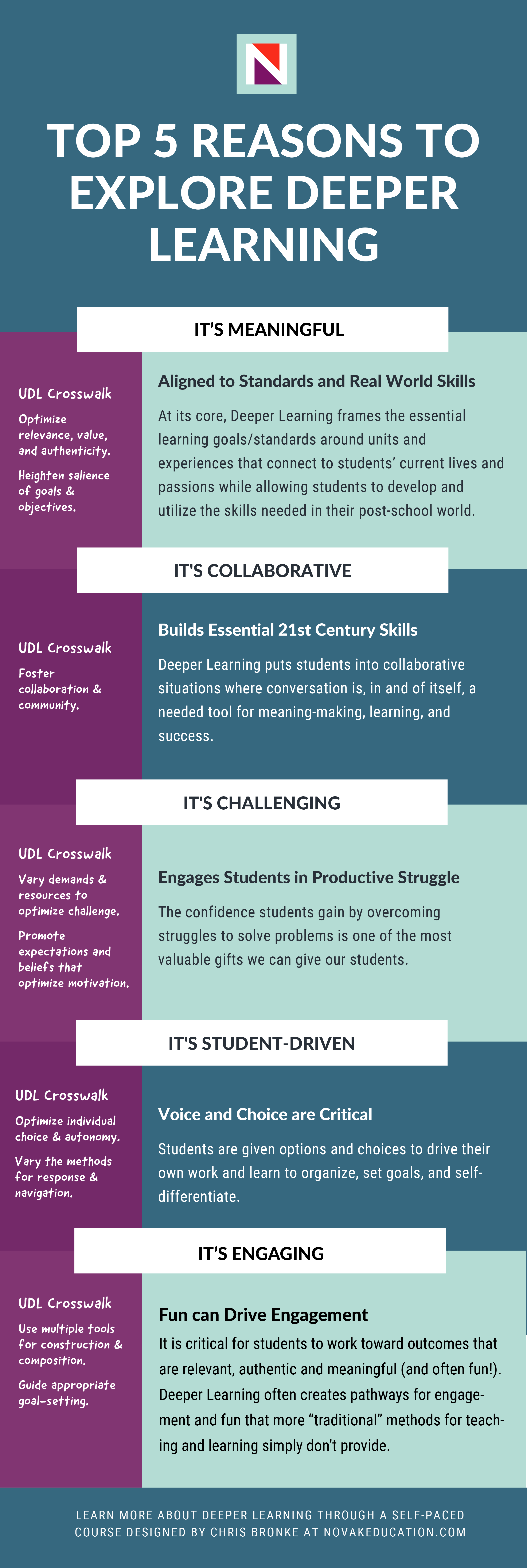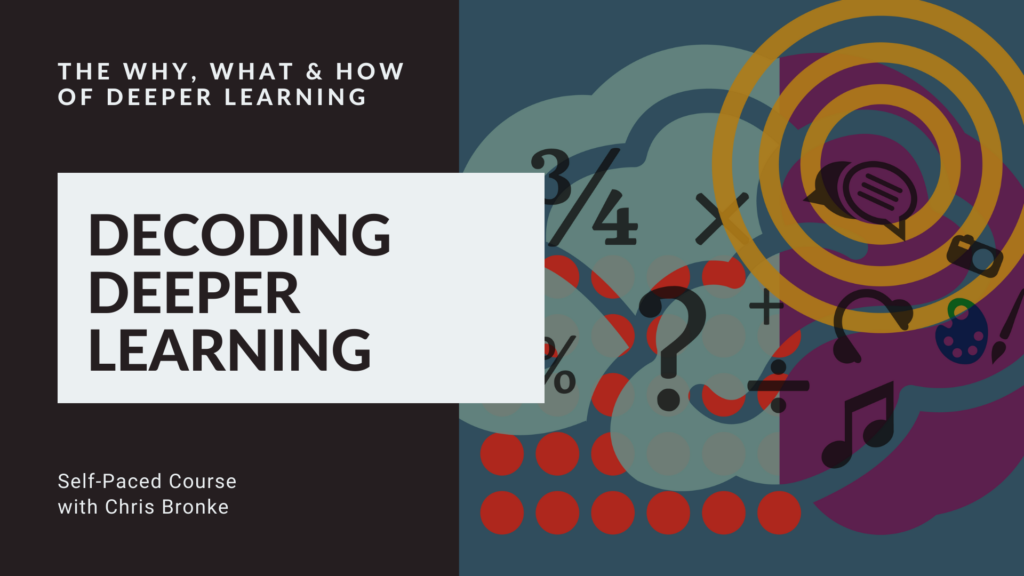Deeper Learning isn’t new; however, one could argue that it has never been more important, needed, and desired than right now. At its core, Deeper Learning seeks to empower students to think deeper, collaborate better, and problem-solve meaningfully. As employers turn their focus to “skills” like dependability, self-motivation, and problem-solving, teachers, schools, and districts must do the same. Traditional “test-prep” teaching and learning, with a focus on finite skills and rote knowledge, leave students lacking the opportunities to develop the real skills needed for life after school. A shift to Deeper Learning challenges teachers to rethink what, how, and, perhaps most importantly, why they teach. When done well, a shift to Deeper Learning employs pedagogies and uses assessments that empower students to own their learning experiences in ways that are authentic to their lives now and into the future. Remember, the lives our students are currently living ARE their real lives, so education must be preparing them to navigate their current reality while preparing them for life after school, and Deeper Learning supports and challenges students to do just that.
So, as you move into thinking about your planning for this upcoming school year, I share with you my top five reasons why Deeper Learning matters, is needed, and should be the framework of your thinking as you craft your students’ learning experiences for the year.
Because Deeper Learning is MEANINGFUL
If you are sick of your students asking you, “why are we doing this?”, Deeper Learning is for you. At its core, Deeper Learning frames the essential learning goals/standards around units and experiences that connect to students’ current lives and passions while allowing students to develop and utilize the skills needed in their post-school world. From college to career, Deeper Learning, when done well, immerses students in the entire project-management experience as they navigate their learning, and it is these sorts of skills that make them better students, better learners, and better post-school citizens.

Because Deeper Learning is COLLABORATIVE
Speaking of post-school skills, collaboration is, perhaps more than anything else, at the core of the post-school world, and Deeper Learning sets forth pathways and experiences in which students are encouraged and even required to collaborate with others. I have long argued that, as a school system, we use conversation as a way to assess learning way too often, and that, not nearly enough, we overlook using conversation as a way to make meaning. Deeper Learning puts students into collaborative situations where conversation is, in and of itself, a needed tool for meaning-making, learning, and success.
Because Deeper Learning is CHALLENGING
“If you aren’t frustrated, you aren’t learning.” This has been the credo of my classroom for years now, and one thing I have learned is that students respect me for it. Of course, at times, they resent me for it when the struggle is real; however, the confidence they gain by overcoming said struggle is one of the most valuable gifts we can give our students. And, Deeper Learning does exactly this. There will be times during the process that students will want to give up, will fail, will feel clueless and even “stupid”, but with the right guidance, support, and care, the struggle is productive and students will find their way through these challenges and come out on the other side with a better sense of self, a deeper belief in their abilities, and an appreciation for being challenged.
Because Deeper Learning is STUDENT-DRIVEN
I don’t know about you, but one of my least favorite parts of teaching is (well, was) that one student (and yes, we have all had them) who enters class daily saying, “what are we doing today?” For my first few years of teaching, before I fully immersed myself in Deeper Learning, that question used to drive me crazy, but I couldn’t figure out why. However, upon some honest self-reflection, I realized it drove my crazy because, deep down, I wanted students to know what we were doing…my inner monologue telling myself, “um, dude, I told you at the end of class yesterday, so how do you not know what we are doing?!” That was a ME problem, and Deeper Learning not only stops that question from happening, but it has allowed me to flip that right back to the student. So, now, to start class, I get to ask individual students and/or small groups, “what are you doing today?” It’s life-changing!
Because Deeper Learning is ENGAGING
Over the last ten years or so, I have developed a deep passion for researching wine. I have read probably 15 different wine books, read articles daily, go to tastings, create my own tastings and so much more. Why? Well, aside from it being an excuse to drink wine, the simple answer is it is FUN. When we, as people, enjoy something, it goes without saying, we commit to it more. Deeper Learning, while it is still school and isn’t a magic wand for 100% engagement, empowers students and teachers to get more from the experience, in and out of class. Life is short, teachers don’t get paid enough, students are forced to be there, so, if we aren’t finding ways to make it relevant, authentic, and meaningful (and often fun!) for us and them, then what are we doing? Deeper Learning creates pathways for engagement that more “traditional” methods for teaching and learning simply don’t provide.
Download the Infographic: Deeper Learning & UDL Infographic.
Explore the depths of Deeper Learning




